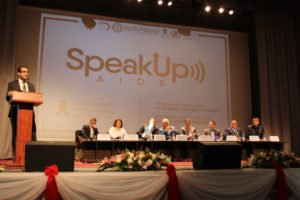Author: Marina Maksimova, Kazakhstan

Over 400 students from universities of the CIS countries took part in the first international debate tournament on HIV “SpeakUp: AIDS” in Almaty, Kazakhstan.
“Almaty is the city of students and active young people, who are interested in gaining knowledge, in particular in the area of healthy lifestyle and HIV prevention. Out of 5 000 people living with HIV in Almaty one-third is young people. Our city has a tradition to conduct spectacular campaigns dedicated to the World AIDS Day. This year, it was the first time we held debates on this topic among young people,” said Murat Daribayev, deputy akim (akim is the head of a local government in Kazakhstan and Kyrgyzstan – note of editor) of Almaty.
Among the debate participants, there was the best 2017 speaker in the world representing the international debate movement, the main judge Raffy Marshall (Oxford), students from the major higher educational institutions of the country as well as from the UK, Kyrgyzstan, Russia, Tajikistan, and Sweden. The international panel selected 120 teams to take part in debates on this critical social issue. The tournament was held in line with the British parliament model.
The right to argue
Aleksandr Semenov, a student of the law department at the Kazakh National University is not a newbie in the debate movement. For the seventh year in a row, he wins his right to take part in the debates. He got through to the final round ten times, won five tournaments and even trained other debaters.
“The debates are a separate culture. It is sort of a recharger for your brain to always keep you thinking and analyzing to be able to assess a problem from various points of view. Additionally, you have to do it as fast as possible. The topics are always different: politics, culture, religion, sports… It was the first time when we had our debates on HIV. Therefore, the first conclusion is that we cannot keep silent, we should talk about it and ruin the stereotypes. Young people may be the opinion leaders,” says Aleksandr.
There are two people on his team: he and Altynay Dzhumasheva, a student of the American University of Central Asia from Kyrgyzstan. For debaters, it is not important which country or university the team members represent, the main thing is the efficiency of their joint efforts, mutual support, ability to swiftly catch the idea voiced by the partner and develop it in an emotional and convincing manner.
Stronger arguments
At the tournament, the debaters could use any of the three languages: English, Kazakh or Russian. The organizers selected several key topics. They included digitalization of the health care, drug use problems, sexual education, HIV and children, stigma and discrimination of people living with HIV. The participants were to be competent in all the topics.
“One of the rounds addressed the topic of drug addiction. What should change in the countries and in minds to give information about drugs and for drug users to have a choice of treatment and rehabilitation options? Our “opposition” team had to resist a storm of arguments from the “government.” Finally, the victory was ours! Our arguments on the need to adopt an efficient state drug policy and open state rehabilitation centres appeared to be stronger,” tells Altynay Dzhumasheva.
Counting on the young people
Debates among young people in Kazakhstan are a new instrument in response to AIDS. Organizers of the debates included the local Almaty administration, the Ministry of Health of the Republic of Kazakhstan, the Republican AIDS Center, the Health Department of Almaty, UNAIDS, and UNICEF.
Search for the new formats of HIV prevention among young people is an important topic to be discussed at the International AIDS Conference (AIDS 2018) in Amsterdam.
“Kazakhstan has already started its preparations to declare the elimination of mother-to-child transmission of HIV. We hope that information about HIV will continue to be accessible and accurate. The progress we have achieved has been to a great extent made possible thanks to people not being silent and youth being actively engaged,” HIV/AIDS Specialist from UNICEF Ruslan Malyuta is saying.
The winner of the English league of the first international debate tournament on HIV was a team from the People’s Friendship University of Russia. The best team in the Kazakh league was from the Taraz State University (Kazakhstan), and in the Russian league – from the Eurasian National University (Astana).



